De Nederlandse schrijver Nicolaas Anslijn werd op 12 mei 1777 geboren in Leiden. Zie ook alle tags voor Nicolaas Anslijn op dit blog.
Uit: De brave Hendrik
“Ik ben laatst bij Hendrik aan huis geweest, maar gij moest eens zien, hoe gehoorzaam hij zijnen ouders is.
Als zij hem zeggen, dat hij iets doen moet, dan doet hij het ook terstond.
Hij wacht nooit tot zij het hem tweemaal zeggen.
Hij zegt ook nooit: laat mijn broer of mijne zuster het doen; maar hij is altijd blijde, als hij iets voor zijne lieve ouders doen kan.
Als zij hem iets verbieden, dan laat hij het ook dadelijk.
Hij vraagt nooit: waarom moet ik dat laten?
Hij ziet ook nooit knorrig, als zijne ouders hem iets verbieden.
Ik prees Hendrik om zijne gehoorzaamheid, maar hij wilde niets daarvan hooren.
Wat denkt gij, dat hij mij antwoordde?
Mijne ouders weten zeer wel, waarom zij mij iets gebieden of verbieden.
Zij weten wel, wat mij nuttig of schadelijk is.
Foei! zou ik ongehoorzaam wezen? Zou ik mijne ouders bedroeven?
Toen ik laatst eens ongehoorzaam was, stonden mijne moeder de tranen in de oogen; maar ik zal wel zorg dragen, dat het niet weder gebeurt.
Ik antwoordde niets: maar ik nam het besluit om in het vervolg ook zoo gehoorzaam te zijn als Hendrik.”
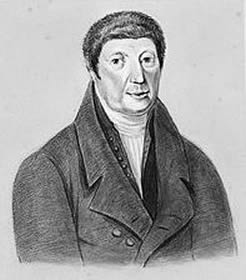
Nicolaas Anslijn (12 mei 1777 — 18 september 1838)
De Argentijnse schrijfster, theatermaakster en caricaturiste Diana Raznovich werd geboren op 12 mei 1945 in Buenos Aires. Zie ook alle tags voor Diana Raznovich op dit blog.
Uit: Herbstzeitlose (Vertaald door Gerd-Rainer Prothmann)
„ROSALIA schenkt ihr nach. GRISELDA schläft augenblicklich ein.
ROSALIA Erzähl mir was. Irgendwas Persönliches.
GRISELDA
(halb betäubt wird sie wach)
Ja, ja. Hab ich dir nie von Daniel erzählt?
ROSALIA Wer ist Daniel?
GRISELDA Ein Freund, den ich mal hatte. Er war Student der Literaturwissenschaft
und hat Mama überhaupt nicht gefallen. Was kann denn schon bei Literatur
rauskommen, sagte sie mir. Poesie, Mama. Poesie. Es dreht sich alles. Und
alles dreht sich. Die Planeten drehn sich. Der Mond.
ROSALIA Ja, du musst mit mir zu Félix kommen.
GRISELDA Nein, Rosalia, nein! Ich habe einige Prinzipien und Anschauungen. Und
ich habe 20 Jahre in deinem Haus gelebt und habe das toleriert, aber nicht
akzeptiert. Soll ich dir was kochen?
ROSALIA Nein!
GRISELDA Ich singe dir was.
ROSALIA Ja, was Spanisches.
GRISELDA schickt sich an, irgendeinen Flamenco zu singen.
Und was passierte mit Daniel?
GRISELDA Er hat mich angelogen. Er kannte komplizierte Dichter, die ich nicht
kannte. Und eines Tages brachte er mir das Gedicht eines solchen Dichters
und hat mir erzählt, es wäre von ihm. Und ich hab das geglaubt. Ich hab mich
noch mehr in ihn verliebt, weil ich dachte, es wäre von ihm.
“In unseren dunklen Gewässern
Funkelt beständig ein Glanz:
Der Ring einer Braut
Oder das wachsame Auge Gottes.“
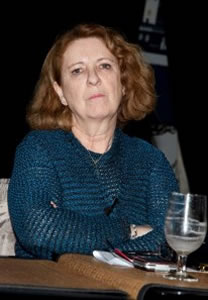
Diana Raznovich (Buenos Aires,12 mei 1945)
De Russische schrijver en dissident Andrej Aleksejevitsj Amalrik werd geboren in Moskoui op 12 mei 1938. Zie ook alle tags voor Andrej Amalrik op dit blog.
Uit: Will the Soviet Union Survive Until 1984?
“The Soviet System does not intend to restore Stalinism, or to persecute the members of the intelligentsia, or to help those who do not ask for it. It just wants everything to be unchanged. People should recognize authority, the intelligentsia should be quiet, and dangerous reforms should not threat the system. The Soviet regime does not attack. It just protects itself. Its slogan is: „Let everything be unchanged”. It must have been the most humane goal of the Soviet System. That’s why the Soviet citizens, also the heads of industry, writers, and producers are less free than they were fifteen years earlier. The authorities tried to make reforms. As a result, the old bureaucratic elite would be replaced with a new, more intelligent and open-minded society. „But we know that there have never been clever persons in the history of Russia. And the history of mankind has never meant progress”. The process of liberalization is often hindered and degraded instead of hastening. That’s why we doubt in its success. There was an impression that the plan of liberalization has been drawn up and that the reforms were made, but actually there was not any plan of liberalization. There were only attempts of decorating the bureaucratic system.”
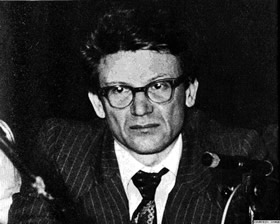
Andrej Amalrik (12 mei 1938 – 12 november 1980)
De Belgische, Franstalige, dichter en schrijver Maurice Carême werd geboren op 12 mei 1899 in Waver bij Brussel. Zie ook alle tags voor Maurice Carême op dit blog.
LA FILLETTE ET LE POEME
“Le poème, qu’est-ce que c’est ?
M’a demandé une fillette :
Des pluies lissant leurs longues tresses,
Le ciel frappant à mes volets,
Un pommier tout seul dans un champ
Comme une cage de plein vent,
Le visage triste et lassé
D’une lune blanche et glacée,
Un vol d’oiseaux en liberté,
Une odeur, un cri, une clé ?”
Et je ne savais que répondre
Jeu de soleil ou ruse d’ombre ? –
Comment aurais-je su mieux qu’elle
Si la poésie a des ailes
Ou court à pied les champs du monde ?
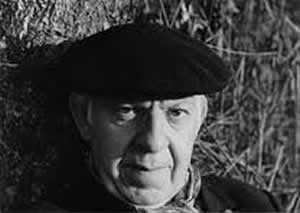
Maurice Carême (12 mei 1899 – 13 januari 1978)
De Italiaanse schrijver en dichter Massimo Bontempelli werd geboren op 12 mei 1878 in Como. Zie ook alle tags voor Massimo Bontempelli op dit blog.
Uit: The Chess Set in the Mirror (Vertaald door Estelle Gilson)
‘And now,’ he continued, getting more heated, ‘it’s time you knew the facts. You should know that chess pieces are much, much older than people. Humans were created many centuries after chess pieces, and they are gross imitations of pawns and bishops, kings and queens. Even their horses are imitations of ours. Then they built towers to imitate what we had. After that, they did a lot of other things, but those are superfluous. And everything that occurs among human beings, especially the most important things, which one studies in history, are nothing more than confused imitations and a hodgepodge of variants of the great games of chess we have played. We are the exemplars and governors of humanity. Those things I told you before concerned the other images, and I feel sorry for them, but we are truly eternal. And we, effectively, are in charge of the world. We are the only ones who have a raison d’être and an ideal.’ ”
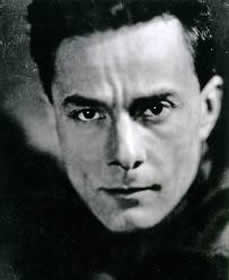
Massimo Bontempelli (12 mei 1878 – 21 juli 1960)
